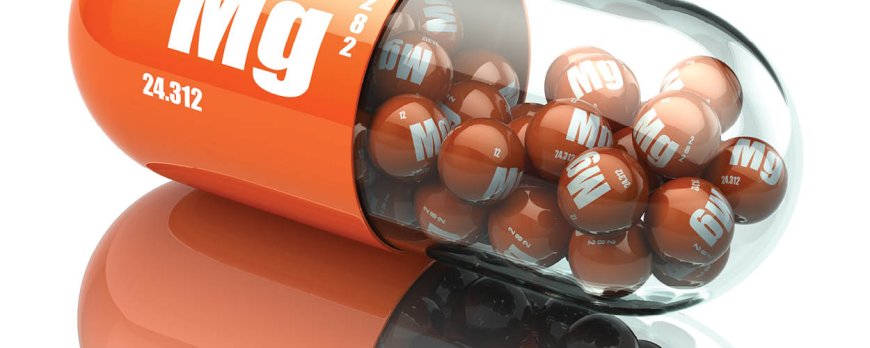Which is better magnesium citrate or bisglycinate?
Explore 'Which is better magnesium citrate or bisglycinate?' as we delve into benefits, absorption rates, and potential side effects of these vital supplements.

Which is better magnesium citrate or bisglycinate?
Magnesium citrate and bisglycinate are both popular forms of magnesium supplements, but which one is superior? In this article, we will explore the benefits, absorption rates, and potential side effects of magnesium citrate and bisglycinate to determine which form is better for supplementation.
Key Takeaways:
- Magnesium citrate is known for its higher absorption rate and effectiveness in relieving constipation.
- Magnesium citrate is also recommended for migraine prevention.
- Magnesium bisglycinate is well-tolerated, absorbed in the body, and has a calming effect.
- Magnesium bisglycinate is used for stress relief, insomnia, anxiety, and reducing inflammation.
- The choice between magnesium citrate and bisglycinate depends on individual health needs and goals.

Benefits of Magnesium Citrate
Magnesium citrate offers several advantages, making it a preferred choice for certain health concerns. Here are some of the key benefits of magnesium citrate:
- Relief of Constipation: One of the primary benefits of magnesium citrate is its effectiveness in relieving constipation. It acts as a natural laxative by increasing water in the intestines, which helps stimulate bowel movements.
- Migraine Prevention: Research suggests that magnesium citrate may help prevent or reduce the frequency and intensity of migraines. It is believed to help relax blood vessels and regulate neurotransmitter levels, which can contribute to migraine relief.
Consult a healthcare professional:
While magnesium citrate offers these benefits, it's important to consult with a healthcare professional before starting any supplementation. They can help determine the appropriate dosage and duration of use based on your individual health needs and goals. Additionally, they can evaluate potential interactions with any existing medications or medical conditions.
It's worth noting that there are other forms of magnesium supplements available, such as magnesium oxide, magnesium chloride, magnesium threonate, magnesium malate, and magnesium sulfate. Each form has its own unique benefits and uses. The absorption of magnesium supplements also depends on the form used, with organic salts like citrate and glycinate generally being more absorbable.
Ultimately, the choice between magnesium citrate and other forms, including magnesium bisglycinate, depends on your specific health concerns and goals. Consulting with a healthcare professional is crucial in determining the best form and dosage of magnesium supplement for you, taking into account your individual needs and current magnesium levels.
Benefits of Magnesium Bisglycinate
Magnesium bisglycinate provides numerous benefits, making it a popular option for individuals seeking relief from specific conditions. This form of magnesium supplement is well-tolerated by the body and has a calming effect, which can be particularly beneficial for those dealing with stress, anxiety, and insomnia. Additionally, magnesium bisglycinate is known for its ability to reduce inflammation, offering potential relief for individuals with inflammatory conditions.
One of the key advantages of magnesium bisglycinate is its gentle nature on the digestive system. Unlike some other forms of magnesium supplements, it is less likely to cause stomach upset or diarrhea. This makes it a suitable choice for individuals with sensitive digestion.
In terms of absorption, magnesium bisglycinate is well-absorbed by the body, ensuring that the magnesium is effectively utilized. This can lead to improved overall health and well-being.
To summarize, the benefits of magnesium bisglycinate include:
- Calming effect, aiding in stress relief, anxiety, and insomnia
- Reduction in inflammation, potentially helpful for inflammatory conditions
- Gentle on the digestive system, minimizing the risk of stomach upset
- Good absorption, promoting optimal utilization of magnesium in the body

Other Forms of Magnesium Supplements
In addition to magnesium bisglycinate, there are several other forms of magnesium supplements available. These include magnesium oxide, magnesium chloride, magnesium threonate, magnesium malate, and magnesium sulfate. Each form has its own unique benefits and uses, so it is important to consult with a healthcare professional to determine the most suitable option based on individual needs and goals.
Absorption Rates and Effectiveness
The absorption rates and overall efficacy of magnesium citrate and bisglycinate are important considerations when comparing the two forms. Magnesium citrate is known for its higher absorption rate, allowing it to be readily taken up by the body. This makes it a preferred choice for individuals seeking quick relief from constipation. Additionally, magnesium citrate has shown promising results in preventing migraines, further highlighting its effectiveness as a supplement.
On the other hand, magnesium bisglycinate is well-tolerated and easily absorbed by the body. It has a calming effect, making it an ideal choice for stress relief, insomnia, anxiety, and reducing inflammation. This form of magnesium is particularly beneficial for individuals who are sensitive to digestive disturbances often associated with magnesium citrate supplementation.
When considering which form of magnesium to choose, it is important to evaluate individual health needs and goals. Magensium citrate may be more suitable for those seeking relief from constipation or migraine prevention, while magnesium bisglycinate may be preferred for its calming and stress-relieving properties. Consulting with a healthcare professional can provide personalized guidance on dosage and the best form of magnesium supplement based on individual needs and current magnesium levels.
Dosage Recommendations
It is crucial to determine the correct dosage of magnesium supplements for safe and effective use. The recommended dosage for magnesium citrate varies depending on the specific health condition being addressed. For constipation relief, a typical dosage is 240 to 320 milligrams per day. For migraine prevention, a dosage of 600 to 800 milligrams daily may be recommended. It is important to start with a lower dosage and gradually increase it, as high doses can cause diarrhea.
When it comes to magnesium bisglycinate, the recommended dosage typically ranges from 200 to 400 milligrams per day. This form of magnesium is well-tolerated, and higher doses can be taken without the risk of digestive issues. However, it is still advisable to start with a lower dosage and adjust as needed based on individual response and health goals.
Keep in mind that these are general dosage guidelines, and individual requirements may vary. Consulting with a healthcare professional is crucial to determine the appropriate dosage based on your specific needs and current magnesium levels. They can evaluate your health condition, medications, and any underlying health issues to provide personalized recommendations.
Key points:
- For magnesium citrate, typical dosages range from 240 to 800 milligrams per day, depending on the condition being treated.
- Magnesium bisglycinate is typically recommended at a dosage of 200 to 400 milligrams per day.
- Starting with a lower dosage and gradually increasing it is advisable to avoid potential side effects.
- Consulting with a healthcare professional is essential to determine the best dosage for your individual needs and circumstances.
By following the recommended dosage guidelines and seeking professional advice, you can ensure the safe and effective use of magnesium supplements to achieve your health goals.

Potential Side Effects of Magnesium Citrate and Bisglycinate
Like any supplement, magnesium citrate and bisglycinate come with potential side effects that should be taken into consideration. While magnesium is generally safe for most individuals when taken in appropriate doses, it is important to be aware of any possible adverse reactions.
Potential side effects of magnesium citrate:
- Abdominal cramping or discomfort
- Diarrhea
- Nausea or vomiting
- Dehydration
- Electrolyte imbalances
Potential side effects of magnesium bisglycinate:
- No significant side effects have been reported with the use of magnesium bisglycinate. However, some individuals may experience mild gastrointestinal discomfort, such as bloating or diarrhea, especially when taken in large doses.
It is important to note that the occurrence and severity of side effects may vary from person to person. If you experience any persistent or severe side effects, it is recommended to discontinue use and consult with a healthcare professional.
Consulting a healthcare professional
Before starting any magnesium supplement, it is advisable to consult with a healthcare professional. They can assess your individual health needs, current magnesium levels, and help determine the best form and dosage of magnesium supplement for you. This is particularly important if you have any underlying medical conditions or are taking medications that may interact with magnesium.
By seeking guidance from a healthcare professional, you can ensure that you are using magnesium citrate or bisglycinate safely and effectively to support your overall health and well-being.
Bioavailability and absorption of magnesium supplements
The bioavailability and absorption rates of magnesium supplements vary depending on the form, and the organic salts citrate and glycinate are typically more easily absorbed. When considering magnesium supplementation, it is important to understand how the body absorbs and utilizes this essential mineral.
Organic salts like magnesium citrate and magnesium bisglycinate have higher bioavailability compared to other forms such as magnesium oxide or magnesium sulfate. This means that a greater proportion of these forms can be absorbed and utilized by the body. Citrate is known for its ability to be readily absorbed in the digestive tract, making it a popular choice for those seeking quick relief from constipation or hoping to prevent migraines.
Magnesium bisglycinate, on the other hand, is chelated with the amino acid glycine, which enhances its absorption. This form is well-tolerated by individuals and is often used to support relaxation, sleep, and stress relief. The chelation process helps protect magnesium from interacting with other substances in the digestive system, allowing for better absorption and reducing the risk of potential side effects.
Factors affecting absorption
- The presence of other nutrients: Certain minerals, such as calcium and zinc, can compete with magnesium for absorption in the body. Therefore, it is important to ensure a balanced intake of these minerals to optimize magnesium absorption.
- Dosage: Higher doses of magnesium supplements may decrease absorption efficiency. It is recommended to divide the dosage into smaller amounts taken throughout the day for better absorption.
- Gastrointestinal health: Individuals with conditions compromising gut health, such as inflammatory bowel disease or celiac disease, may experience reduced magnesium absorption. In such cases, consulting with a healthcare professional is crucial to determine the appropriate form and dosage.
In conclusion, the bioavailability and absorption of magnesium supplements are influenced by various factors, including the form used and individual health circumstances. Magnesium citrate and magnesium bisglycinate are two popular forms known for their absorption efficiency and unique benefits. However, it is important to consult with a healthcare professional to determine the most suitable form and dosage based on individual needs and current magnesium levels.

Other forms of magnesium supplements
Apart from magnesium citrate and magnesium bisglycinate, there are various other forms of magnesium supplements that individuals can consider. Each form has its own unique benefits and uses, making it important to understand the differences when choosing the right one for your needs.
Magnesium Oxide
Magnesium oxide is a commonly available form of magnesium supplement. It has a high magnesium content, making it a popular choice for those looking to increase their magnesium levels. However, its absorption rate is relatively low compared to other forms, which means a higher dosage is needed to achieve the desired effect.
Magnesium Chloride
Magnesium chloride is another form of magnesium supplement that has a higher absorption rate compared to magnesium oxide. It is commonly used topically as a spray or oil for transdermal absorption. It is also available in oral supplement form and is well-tolerated by most individuals.
Magnesium Threonate
Magnesium threonate is a newer form of magnesium supplement that is gaining popularity due to its potential cognitive benefits. It has been found to cross the blood-brain barrier more easily, which may support brain health and function. However, more research is needed to fully understand its effects.
Magnesium Malate
Magnesium malate is a combination of magnesium and malic acid. This form of magnesium is known for its potential to support energy production and reduce muscle pain and fatigue. It is often used by individuals looking to support exercise performance and recovery.
Magnesium Sulfate
Magnesium sulfate, also known as Epsom salt, is a form of magnesium that is commonly used in baths for relaxation and muscle soreness. It can also be used topically or taken orally as a supplement. However, it is important to note that its absorption rate may vary depending on the method of application.
When considering other forms of magnesium supplements, it is always important to consult with a healthcare professional to determine the best form and dosage based on your individual needs and current magnesium levels. They can provide personalized guidance and ensure that you are getting the most out of your magnesium supplementation.
Consulting a healthcare professional
Seeking guidance from a healthcare professional is crucial in determining the most suitable magnesium supplement and dosage for individual requirements. While both magnesium citrate and magnesium bisglycinate have their benefits, it is important to understand which form is better suited to address specific health concerns. A healthcare professional can provide personalized advice based on an individual's unique needs and overall magnesium levels.
The choice between magnesium citrate and magnesium bisglycinate depends on various factors, such as the desired benefits and potential side effects. For individuals experiencing constipation or seeking migraine prevention, magnesium citrate may be the preferred choice due to its higher absorption rate and effectiveness in relieving constipation. On the other hand, magnesium bisglycinate is well-tolerated and has a calming effect, making it beneficial for stress relief, insomnia, anxiety, and reducing inflammation.
It is important to note that there are other forms of magnesium supplements available, including magnesium oxide, magnesium chloride, magnesium threonate, magnesium malate, and magnesium sulfate. Each form has its own unique benefits and uses. The bioavailability and absorption of magnesium supplements also depend on the form used, with organic salts like citrate and glycinate generally being more absorbable in the body.
Overall, consulting with a healthcare professional is essential to determine the most suitable form and dosage of magnesium supplement. They can assess an individual's health needs, current magnesium levels, and any potential contraindications or interactions with medications. By seeking professional guidance, individuals can make informed decisions regarding their magnesium supplementation, ensuring optimal results and minimizing the risk of side effects.

Summary and Comparison
By summarizing and comparing the key aspects of magnesium citrate and bisglycinate, we can gain a clearer understanding of their respective advantages.
When it comes to choosing between magnesium citrate and magnesium bisglycinate, both forms have their benefits. Magnesium citrate is preferred for its higher absorption rate and effectiveness in relieving constipation. It is also recommended for migraine prevention. On the other hand, magnesium bisglycinate is well-tolerated, absorbed in the body, and has a calming effect. It is used for stress relief, insomnia, anxiety, and reducing inflammation.
- Magnesium citrate benefits:
- Higher absorption rate
- Relieves constipation
- Helps prevent migraines
- Magnesium bisglycinate benefits:
- Well-tolerated
- Has a calming effect
- Used for stress relief, insomnia, anxiety, and reducing inflammation
The choice between the two forms depends on individual health needs and goals. It is also worth noting that there are other forms of magnesium supplements available, including magnesium oxide, magnesium chloride, magnesium threonate, magnesium malate, and magnesium sulfate. The absorption of magnesium supplements depends on the form used, and organic salts like citrate and glycinate are generally more absorbable.
When considering magnesium supplementation, it is important to consult with a healthcare professional to determine the best form and dosage based on individual needs and current magnesium levels. They can provide personalized recommendations and ensure optimal results while minimizing potential side effects.
Conclusion
Choosing between magnesium citrate and bisglycinate ultimately depends on personal preferences and specific health concerns. Both forms of magnesium have their own benefits and uses.
Magnesium citrate is known for its higher absorption rate, making it more effective in relieving constipation. It is also often recommended for its potential in preventing migraines.
On the other hand, magnesium bisglycinate is well-tolerated, absorbed in the body, and has a calming effect. It is commonly used for stress relief, insomnia, anxiety, and reducing inflammation.
When considering magnesium supplementation, it's essential to consult with a healthcare professional. They can help determine the best form and dosage of magnesium supplement based on individual needs and current magnesium levels.
Other forms of magnesium supplements, such as magnesium oxide, magnesium chloride, magnesium threonate, magnesium malate, and magnesium sulfate, also offer unique benefits and uses. The absorption of magnesium supplements depends on the form used, with organic salts like citrate and glycinate generally being more absorbable.
In summary, the choice between magnesium citrate and bisglycinate should be based on individual health needs and goals. Consulting a healthcare professional will ensure the most appropriate form and dosage of magnesium supplement is chosen, maximizing its benefits for overall well-being.
FAQ
Which is better, magnesium citrate or bisglycinate?
Both forms have their benefits. Magnesium citrate is preferred for its higher absorption rate and effectiveness in relieving constipation and preventing migraines. Magnesium bisglycinate is well-tolerated, absorbed in the body, and has a calming effect. The choice between the two forms depends on individual health needs and goals.
What are the benefits of magnesium citrate?
Magnesium citrate is known for its efficacy in relieving constipation and its potential for preventing migraines.
What are the benefits of magnesium bisglycinate?
Magnesium bisglycinate is well-tolerated, has a calming effect, and is used for stress relief, insomnia, anxiety, and reducing inflammation.
How is the absorption rate and effectiveness of magnesium citrate and bisglycinate?
Both forms have different absorption rates and effectiveness. Magnesium citrate has a higher absorption rate, while magnesium bisglycinate is also well-absorbed by the body.
What are the recommended dosages for magnesium supplements?
The appropriate dosage of magnesium supplements varies depending on individual needs. It is important to consult with a healthcare professional for specific dosage recommendations.
Are there any potential side effects of magnesium citrate and bisglycinate?
Both magnesium citrate and bisglycinate may have potential side effects, which individuals should be aware of before starting supplementation. Consulting with a healthcare professional can provide further guidance on this.
How is the bioavailability and absorption of magnesium supplements?
The bioavailability and absorption of magnesium supplements depend on the form used. Organic salts like citrate and glycinate are generally more absorbable.
What are the other forms of magnesium supplements available?
In addition to magnesium citrate and bisglycinate, other forms of magnesium supplements include magnesium oxide, magnesium chloride, magnesium threonate, magnesium malate, and magnesium sulfate.
Should I consult a healthcare professional before taking magnesium supplements?
Yes, it is important to consult with a healthcare professional to determine the best form and dosage of magnesium supplement based on individual needs and current magnesium levels.






























































































































